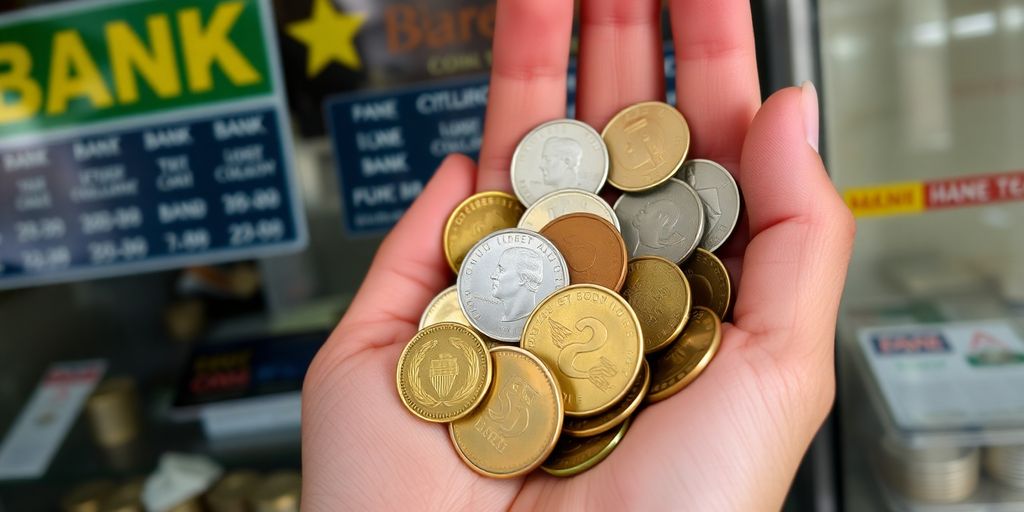If you have a pile of coins sitting around, you might be wondering how to turn them into cash without losing too much value. There are several options available to help you cash in your coins easily and for free. From banks and credit unions to Coinstar machines and local retailers, this guide will help you find the best places to exchange your coins for cash.
- Discovering the Best Good North Indian Restaurants Near Me: A Culinary Journey
- Discover the Top Good Breakfast Places Near Me for a Perfect Start to Your Day
- Discover the Top 10 Non Veg Restaurants Near Me for a Flavorful Dining Experience
- Discover What Restaurants Accept EBT Near Me: A Comprehensive Guide to Your Local Dining Options
- Exploring the Best Locations: Where to Practice Driving Near Me for Safe and Effective Learning
Key Takeaways
- Many banks offer free coin exchange, but you might need to roll your coins.
- Coinstar machines are available in many places but charge a fee unless you choose gift cards.
- Some regional retailers, like QuikTrip and Publix, provide free coin exchange services.
- To get the most value, avoid places that charge high fees and consider using coins directly for purchases.
- Sorting and rolling your coins can save time and help you avoid fees when cashing in.
Top Banks Offering Coin Exchange Services
When it comes to cashing in your coins, many banks provide helpful services. Here’s a look at some of the top banks that can help you exchange your coins for cash.
You are viewing: Discover the Best Places: Where to Cash in Coins Near Me for Maximum Value
Bank of America Policies
Bank of America allows customers to exchange their coins without any fees. However, you must roll your coins before bringing them in. This means you can’t just dump a pile of coins on the counter. Make sure to check with your local branch for specific details.
Wells Fargo Requirements
Wells Fargo also offers free coin exchange services. Like Bank of America, they require customers to use rolled coins. If you don’t have time to roll your coins, you might want to consider other options.
US Bank Procedures
US Bank has a more flexible approach. They do not require customers to roll their coins, allowing you to submit them unrolled. This can save you a lot of time, especially if you have a large amount of change.
Credit Union Options
Many credit unions provide coin exchange services as well. Some, like American Eagle Federal Credit Union, offer free exchanges for everyone, while others may only serve their members. It’s a good idea to check with your local credit union to see what they offer.
| Bank/Credit Union | Fee for Customers | Fee for Non-Customers | Coin Rolling Required |
|---|---|---|---|
| Bank of America | No | Yes | Yes |
| Wells Fargo | No | Yes | Yes |
| US Bank | No | Yes | No |
| American Eagle FCU | No | No | Varies |


Tip: Always call ahead to confirm your bank’s policies on coin exchange. Some banks may have specific requirements or limitations on the amount you can exchange at once.
By knowing your options, you can make the most of your spare change!
Utilizing Coinstar Machines for Coin Exchange
Coinstar Locations
Coinstar machines are found in many places, making it easy to cash in your coins. Here are some common locations:
- Grocery stores (like Walmart and Safeway)
- Pharmacies (such as CVS)
- Retail chains (like Target)
Fees and Charges
Coinstar machines charge a fee of 11.9% for cash exchanges. This means if you put in $100, you’ll only get $88.10 back. However, you can avoid this fee by opting for eGift cards instead.
Gift Card Options
Read More : Discover Where You Can Play Pickleball Near Me: A Comprehensive Guide to Local Courts and Communities
Using Coinstar, you can exchange your coins for eGift cards from popular retailers. This option allows you to keep all your money without any fees. Some retailers include:
- Amazon
- Starbucks
- GameStop
Tips for Using Coinstar
- Check for nearby locations to save time.
- Consider using eGift cards to avoid fees.
- Be aware of the maximum limit of $2,000 per transaction.
- Sort your coins beforehand to speed up the process.
Coinstar is a quick and easy way to turn your spare change into cash or gift cards. Just pour your coins in, and let the machine do the work!
Regional Retailers Providing Coin Exchange Services
QuikTrip Services
QuikTrip is a popular convenience store chain that has offered coin exchange services during times of coin shortages. They have been known to help customers cash in their coins, especially during the pandemic.
Publix Coin Exchange
Publix, a well-known grocery store in Florida, also provides a coin exchange service. However, customers should be aware that there may be a small fee involved when using this service.
Other Regional Retailers
Many local retailers might offer similar services. Here are some options to consider:
- Check with local grocery stores for coin exchange policies.
- Ask convenience stores if they accept coins for purchases.
- Look for community banks that might provide coin cashing services.
Service Fees and Policies
When using regional retailers for coin exchange, it’s important to keep in mind:
- Some stores may charge a service fee for cashing in coins.
- Policies can vary widely, so it’s best to call ahead and confirm.
- Non-customers may face additional fees at some locations.
Remember, many local and regional banks offer free coin cashing services to their customers, so it’s worth checking with them first!
Maximizing Value When Cashing in Coins
Avoiding Fees
- Check for free services: Many banks and credit unions offer free coin exchange for their customers.
- Use Coinstar wisely: If you must use Coinstar, consider opting for gift cards to avoid fees.
- Look for promotions: Some retailers may have special offers that waive fees for coin exchanges.
Using Coins for Purchases
- Spend your coins: Use your coins to buy everyday items like snacks or drinks. It’s a great way to clear out your change.
- Pay for small bills: Don’t hesitate to use coins for small purchases; it’s still money!
- Consider group purchases: Pool your coins with friends for larger purchases, making it easier to spend.
Rolling Coins Efficiently
- Roll as you go: Instead of waiting until you have a lot of coins, roll them as you collect them. This saves time later.
- Use a coin sorter: If you have many coins, consider investing in a coin sorting machine to speed up the process.
- Follow bank requirements: Make sure to roll your coins according to your bank’s guidelines to avoid issues when cashing in.
Alternative Uses for Coins
- Donate spare change: Consider donating your coins to local charities or causes.
- Use for savings: Start a savings jar with your coins; it can add up over time.
- Invest in small items: Use your coins to buy small items or gifts, turning your change into something useful.
Remember, every little bit counts! Turning your coins into cash can help you save or pay for something special.
By following these tips, you can maximize the value of your coins and make the most out of your spare change!
Preparing Your Coins for Exchange
When you’re ready to cash in your coins, it’s important to prepare them properly. Sorting and rolling your coins can save you time and effort. Here are some steps to help you get started:
Sorting and Rolling Coins
- Gather your coins: Collect all your loose change from various places in your home.
- Sort by denomination: Separate your coins into groups based on their type (pennies, nickels, dimes, quarters).
- Roll the coins: Use paper wrappers to roll your coins. Each wrapper typically holds a specific amount:
- Penny: 50 coins
- Nickel: 40 coins
- Dime: 50 coins
- Quarter: 40 coins
Using Coin Sorters
- Consider using a coin sorter machine to speed up the process. These machines can quickly sort and count your coins, saving you time.
- If you don’t want to buy one, check if your local bank has a coin sorting machine available for customers.
Bank Requirements
- Check with your bank: Some banks require coins to be rolled before you can exchange them. Others may accept loose coins, but it’s best to confirm their policy first.
- Non-customer policies: If you’re not a customer, some banks may charge a fee for coin exchange services.
Time-Saving Tips
- Set aside time: Dedicate a specific time to sort and roll your coins to avoid feeling rushed.
- Use a comfortable workspace: Find a clean, flat surface to work on, making the process easier.
Preparing your coins properly can help you maximize their value when exchanging them. Don’t let your spare change sit around; take action and turn it into cash!
Frequently Asked Questions About Coin Exchange
Coin Exchange Limits
When it comes to cashing in your coins, many banks and services have specific limits. For example, Coinstar machines allow a maximum of $2,000 per transaction. If you have more coins, you can do multiple transactions, but that might be a hassle.
Service Fees
Read More : Discover the Best South Indian Non Veg Restaurants Near Me: A Culinary Journey
Most banks offer coin exchange services, but some may charge a fee, especially if you are not a customer. Here’s a quick overview of potential fees:
| Institution | Fee for Non-Customers | Fee for Customers |
|---|---|---|
| Bank of America | Yes | No |
| Wells Fargo | Yes | No |
| US Bank | No | No |
| Credit Unions | Varies | Often No |
Non-Customer Policies
If you’re not a customer of a bank, you might still be able to exchange coins, but be prepared for possible fees. It’s best to check with the bank beforehand to avoid surprises.
Finding Coin Exchange Locations
To find a place to cash in your coins:
- Check with local banks: Call ahead to ask about their policies.
- Look for Coinstar kiosks: They are often found in grocery stores and shopping centers.
- Visit regional retailers: Some stores like QuikTrip and Publix offer coin exchange services.
Remember: Always call ahead to confirm the services available and any fees that may apply. This can save you time and ensure you get the best value for your coins!
Final Thoughts on Cashing in Your Coins
Turning your coins into cash can be a smart move. With so many options available, you can easily find a place near you that will help you get the most value for your change. Whether you choose a bank, a Coinstar machine, or a local store, make sure to check for any fees that might cut into your cash. Remember, every little bit counts, and using your spare change can help you save for something special or pay off bills. So, don’t let those coins sit around collecting dust—take action and turn them into cash today!
Frequently Asked Questions
What are the limits for cashing in coins?
Most places have a cap on how many coins you can exchange at one time. For example, Coinstar typically allows up to $2,000 per transaction.
Are there fees when cashing in coins?
Yes, many places charge fees. Coinstar charges about 11.9% for cash exchanges, but some banks may offer free services if you have an account.
Can non-customers cash in coins at banks?
Some banks will cash in coins for non-customers, but they might charge a fee. It’s best to check with your local bank.
Where can I find coin exchange locations?
You can find coin exchange services at banks, credit unions, Coinstar kiosks, and some regional retailers. A quick online search can help you locate them.
Do I need to roll my coins before cashing them in?
Most banks require you to roll your coins into wrappers. However, some places, like Coinstar, do the counting for you.
What should I do with my coins before exchanging them?
It’s helpful to sort and roll your coins if required. Using a coin sorter can save time, but you can also ask your bank for paper wrappers.
Soure: https://herego.net
Category: near me


